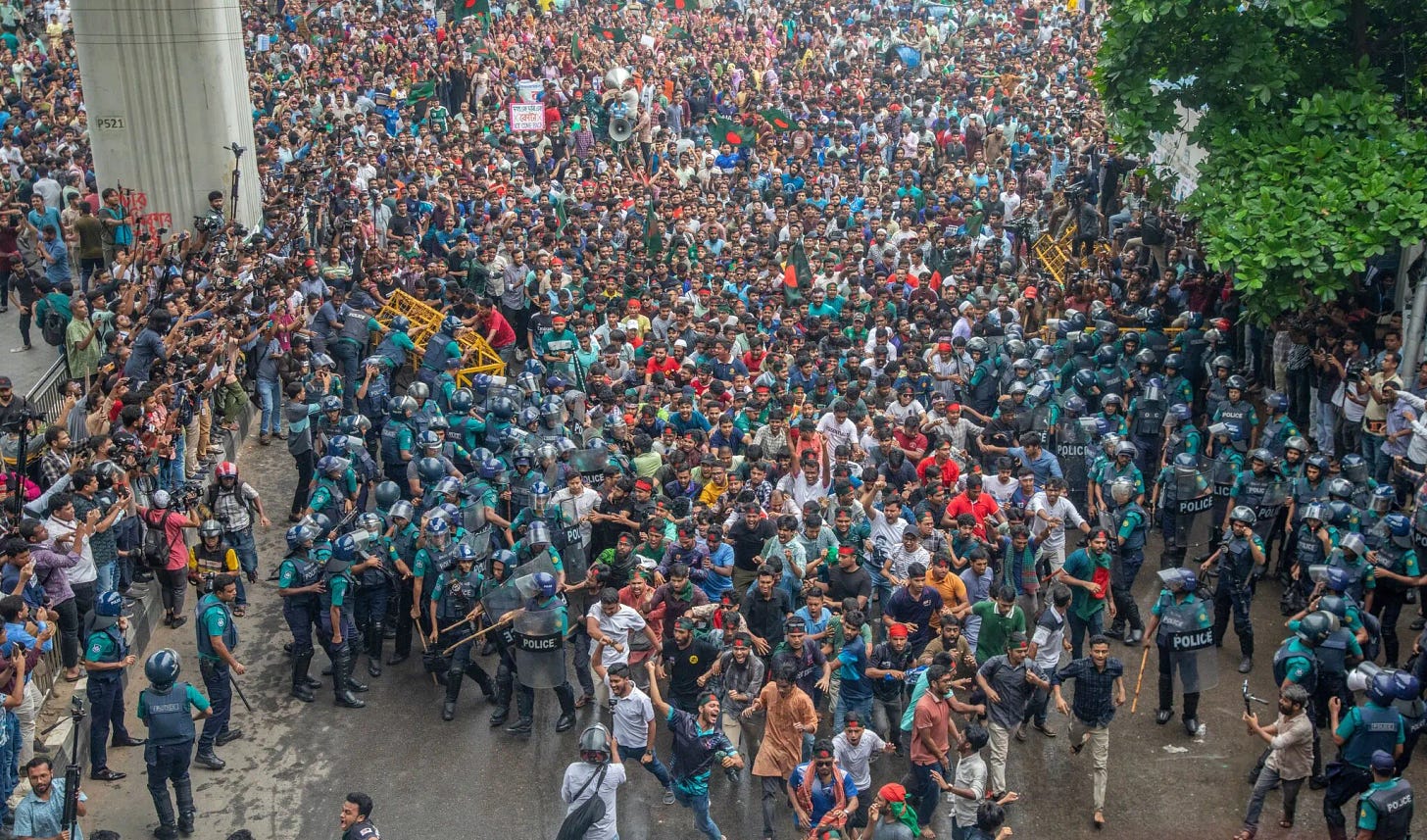Students in Bangladesh Demand Reforms
Public Sector Jobs Quota for Descendants of Participants in the 1971 Liberation War

Students and youth groups in Bangladesh took to the streets on Thursday 11 July to protest the job quota reinstated by the country’s High Court in June, six years after it was scrapped. At least 20 students were injured when police attacked one such protest in Comilla University in country’s south-east on Thursday. Thursday’s protest builds on several weeks of agitation by students and youth since the court ruling in June. This week, students from the country’s major educational institutions such as Universities of Dhaka (DU), Chittagong (CU) and others launched the “Bangla Blockade,” organizing road blockades and strikes outside of universities across the country.
The quota in question is one that allots 30% of all government jobs to descendants of the country’s freedom fighters.
On Wednesday June 10, the appellate division of the country’s top court responded to the students’ main demand of scrapping the quota in government jobs and issued an order staying the implementation of the quota. Following the decision, the Chief Justice of the Supreme Court of Bangladesh asked the students to go back to their classrooms and immediately stop their agitation. However, the protesters declared they would continue with their mobilization on Thursday.
Following the SC judgment, one of the coordinators of the anti-quota movement told the press that, “our demand is directed to the government, not to the court…If the government or executive department assures us directly, we will leave the road.”
The one point agenda of the agitation is to scrap all “illogical and discriminatory quotas in public service through enactment of a law and keeping a minimum quota for marginalized in line with the constitution,” The Daily Star reported.
According to reports, students from mostly left-wing and liberal students groups are on the forefront of the agitation. The movement was supported by Democratic Student Force (DSF), Bangladesh Student Federation, Jatiyatabadi Chhatra Dal, and Bangladesh Chhatra Union among others.
“This is a struggle for establishing a fair recruitment system in government jobs. Everyone joined us forgetting their political views. This is a fight for all, not of any particular party,” one of the leaders of the movement told Daily Observer.
The Workers’ Party of Bangladesh (WPB) also supported the call for reforms in the quota system. It called on the government to not leave the issue to the courts and resolve the matter as per the constitution of the country.
Member of Parliament Rashed Khan Menon from WPB told a meeting of the party’s youth wing on Wednesday, that most of the youth in the country are facing a severe job crisis and it is necessary to address their concerns without compromising the interests of women, disabled and other marginalized groups.
A history of struggle against arbitrary quotas
Students and youth in Bangladesh have been agitating against the provision of a high quota in government jobs for the descendants of the country’s freedom fighters for several years. They have accused it of being arbitrary and against the interests of the majority of youth.
There have been provisions of different kinds of quota or reservation in government jobs in Bangladesh since its formation in 1971. Following its separation from Pakistan, the new government identified all those who participated in the country’s war of liberation as “freedom fighters” and they were given a 30% quota in jobs. Later this quota was continued for their descendants.
Due to the presence of different other kinds of quotas as affirmative action (for women, for disabled, for people from Indigenous communities etc.) the additional 30% quota made the majority of government jobs (around 56%) unavailable for students not falling in any of the categories. This made the quota for descendants of the freedom fighters unpopular leading to the protest movement in 2018.
Following a mass agitation by students in 2018, the Sheikh Hasina government scrapped the quota system in first and second class jobs for the descendants of freedom fighters through a circular. However, this year the country’s High court, on a writ petition filed by some descendants of the freedom fighters, called the circular illegal and reinstated the quota.
Though the government has stated that the reinstatement of quota by the court in June has already been stayed, the protesting students are demanding a proper revision and a law related to the country’s quota system for jobs. Thus, students have continued their strike and road blockades until the government intervenes and drafts a law which would scrap the 30% quota and solidify the quotas favoring oppressed minorities.



